In the United States, February has been chosen as a special month to celebrate cat health, promoting a healthy cat lifestyle with the purrpose to educate cat owners on how to provide a thriving life for their felines.
February is also designated as Spay and Neuter Awareness Month, probably because it is the month that sparks love in all creatures. This is an initiative about reducing the number of stray kittens produced in the later kitten season.
So, we gathered some tips on how you and your vet can help keep your cat in purrfect shape.
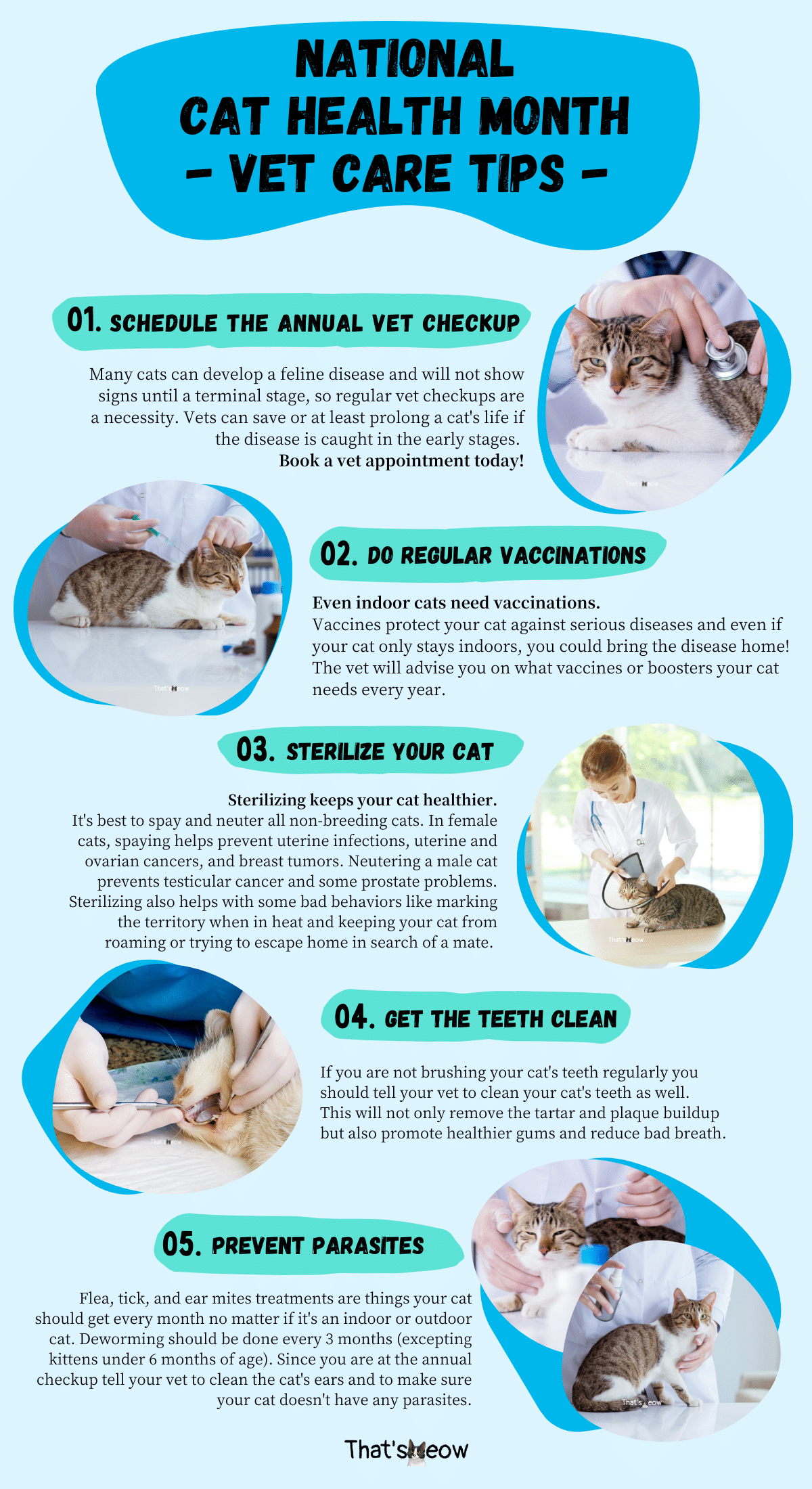
10 Cat Health Care Tips for responsible cat owners
Cats are independent and purretty self-sustainable, but they still need our help to maintain a healthy life. As cat pawrents it’s our job to always keep our fur babies in good shape.
1. Schedule your cat’s yearly vet checkup
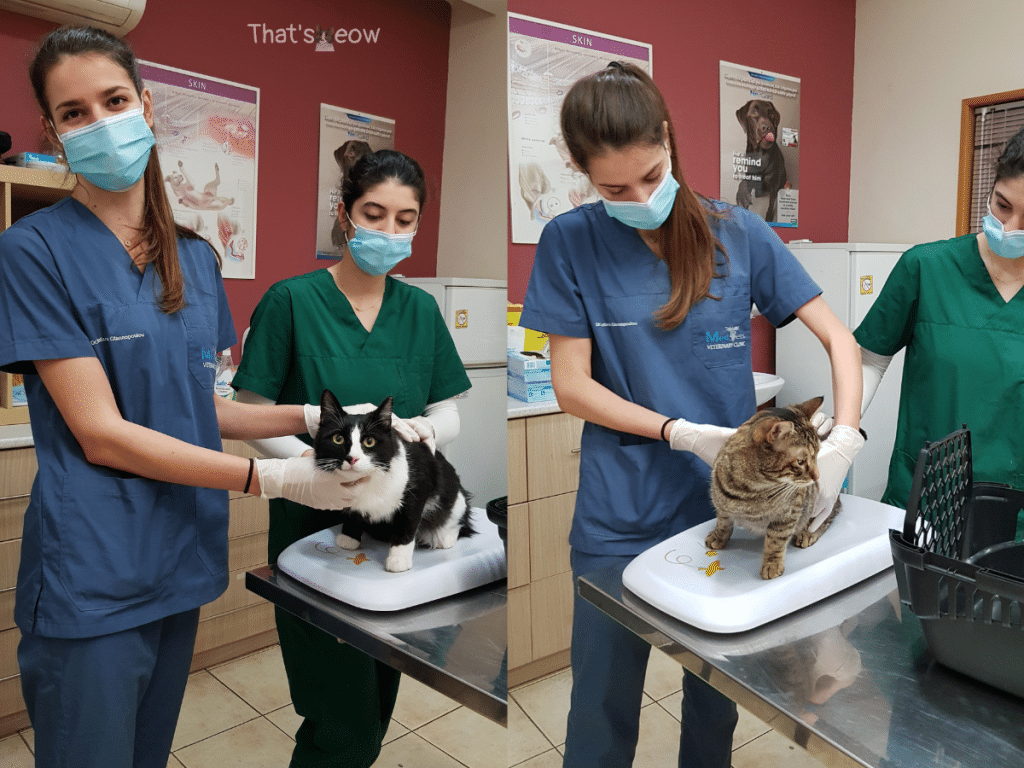
You should take your cat to the vet as is necessary or at least on a yearly basis.
Cats are pretty good at hiding things, and if they get ill, chances are the symptoms will show when the disease it’s already in a late stage. Even if your cat looks perfectly normal it’s best to schedule an annual vet visit to check for any major diseases, allowing you to catch any potential issues early, before they become life-threatening.
The vet will run some tests to assess your cat’s overall health, review and administer any necessary vaccinations, clean your cat’s ears and teeth, apply flea and tick treatments, and probably give a deworming pill if necessary.
Vet checkups done regularly can save your cat’s life or at least help prolong it for as much as possible in case of feline diseases.
2. Keep your cat’s vaccinations up-to-date
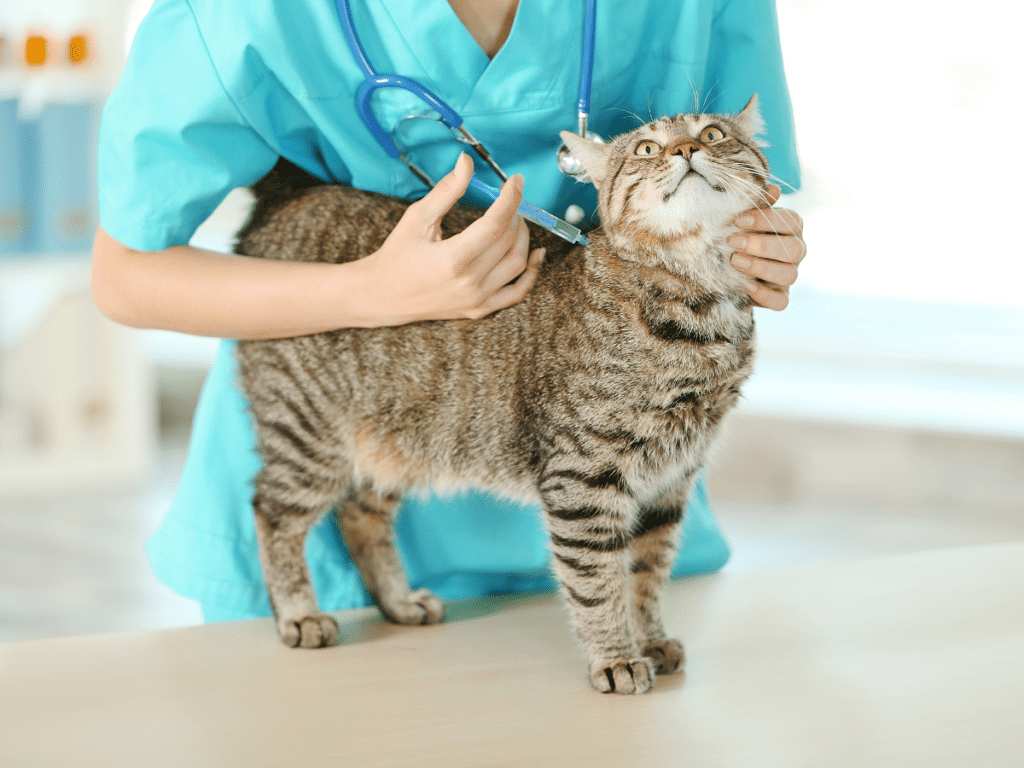
It’s your responsibility to properly vaccinate your cat from the moment you adopt it. Kittens need more regular vaccinations than adult cats and have more vaccination requirements as they can get sick faster.
During a yearly exam, your vet will review your cat’s vaccination history and administer any necessary vaccines to prevent your cat from getting any disease if she decides to wander off or if she spends lots of time outside.
Indoor cats also need vaccinations because anyone could bring some viruses and bacteria into the house from other environments. Maybe you find a cute cat on the street and pet it, then you come home and touch your cat before you wash your hands, now your cat could get a viral infection. Also, indoor cats can escape home and get in contact with other animals.
These are the essential vaccines for your cat:
- Rabies – This vaccine is mandatory in many countries worldwide as rabies is transmissible and fatal to humans.
- FVRCP: Feline Rhinotracheitis Virus/ Herpesvirus 1 (FVR/FHV-1), Feline Calicivirus (FCV), and Feline Panleukopenia (FPV) – These vaccines are administered together in one dose so the vet doesn’t have to poke your cat 3 times.
Other cat vaccines recommended by your vet are:
- Feline leukemia virus (FeLV)
- Chlamydophila felis
- Bordetella bronchiseptica
3. Sterilize your cat
Spaying and neutering keep a cat healthier! It’s best to spay and neuter all non-breeding cats.
In female cats, spaying helps prevent uterine infections, uterine and ovarian cancers, and breast tumors. Neutering a male cat prevents testicular cancer and some prostate problems. Sterilizing helps with some bad behaviors like marking territory when in heat and keeping your cat from roaming or trying to escape home in search of a mate. It also prevents unwanted kitten litters.
4. Get your cat’s teeth cleaned
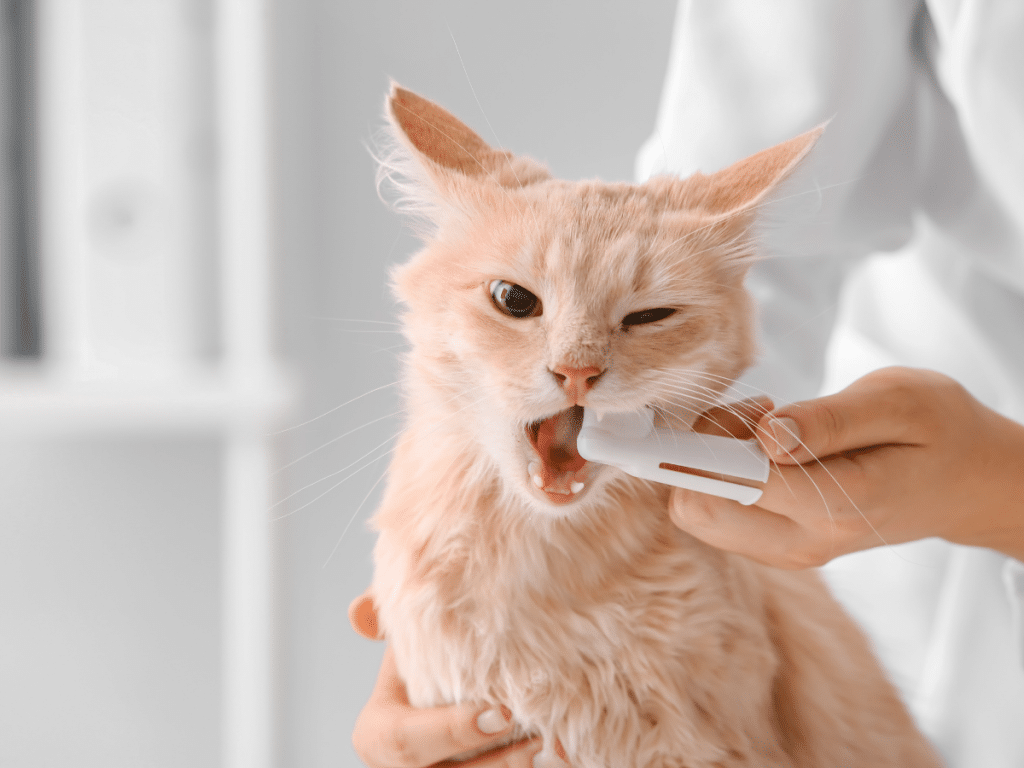
It is important to brush your cat’s teeth regularly, but we know it’s not easy to clean a cat’s teeth. Some people say that eating dry cat food helps with the oral hygiene of cats by scraping the teeth, but that it’s just a myth as cats barely chew any kibble and rather swallow them whole.
If you are not brushing your cat’s teeth it is highly possible they need regular cleaning. Since you are at the annual vet checkup tell your vet to check and clean your cat’s teeth for any tartar and plaque buildup. This will help the overall dental hygiene of your cat, promote healthier gums and reduce bad breath.
5. Administer preventive flea, tick, ear mites, and deworming treatments
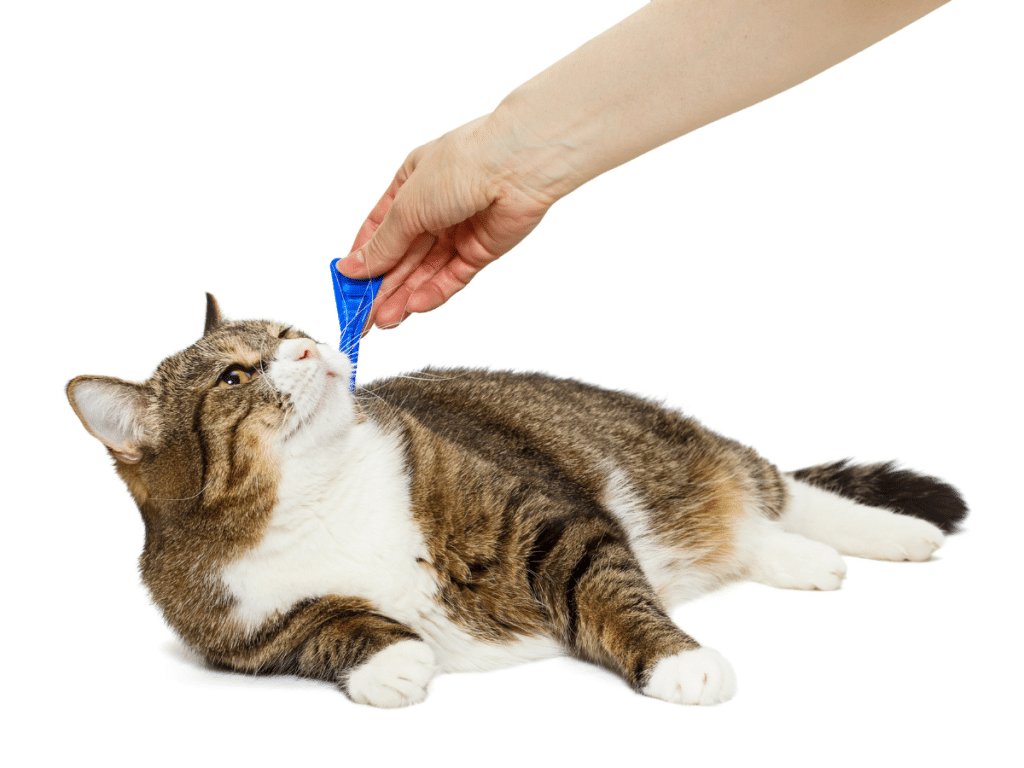
Flea, tick, and ear mites treatments, the ‘spot on’ treatments, are things your cat should get every month no matter if it’s an indoor or outdoor cat. Deworming should be done every 3 months (excepting kittens under 6 months of age who need it more often).
Since you are at the annual checkup tell your vet to clean the cat’s ears and administer flea, tick, ear mites, and deworming treatments to make sure your cat doesn’t have any parasites. Your vet will know your cat’s treatments history and see if they are necessary or not at that moment.
6. Feed your cat a species-appropriate diet

To maintain a healthy life for your cat you need to feed a high-quality, species-appropriate cat food. As cats are carnivores by nature, they can’t tolerate foods high in vegetable protein with a high carbohydrates content.
Make sure that the cat food you are feeding your cat is complete and balanced, approved by the right authorities (AAFCO, FDA), and contains the appropriate nutrients for feline nutrition.
Good cat food should always have a high meat content, it’s low in carbs, has no added sugars and chemical preservatives and it’s grain-free! It should also have an optimal amount of Taurine, Vitamins, and Minerals.
Find out more about proper cat nutrition from our article: Cat food- A Complete Guide to Cat Nutrition
A good diet helps your cat maintain the perfect weight and ensures the good function of all body organs for living a long thriving life. Make sure you also provide daily fresh water for your furbaby.
7. Monitor litter box habits
After you successfully manage to litter train your kitten you should always monitor its litter box habits to be aware of any changes. If a cat is ill most probably you will notice because of her unusual bathroom habits. Urinating or defecating inappropriately (outside the box), runny stools, blood in the stool or in the urine are always bad signs and you should get your cat to the vet as soon as possible.
8. Keep your cat active

Indoor cats tend to be lazy with age and spend more time sleeping than being active. By engaging in play regularly with your cat you will not only strengthen the bond you have with your cat but also help him or her maintain a healthy weight. Pay together with wand toys or engage in fetch games with little fluffy mice or hair ties if you are lucky enough to have a cat that has a dog-like personality. Interactive toys or getting another cat helps if you are a busy person.
Cat scratch posts are mandatory not only because if you don’t have one your cat will scratch your furniture to shreds but because it will keep your cat’s claws healthy.
Indoor cats can also keep active by climbing cat shelves on walls or running in a cat wheel.
9. Maintain a Regular Grooming Routine
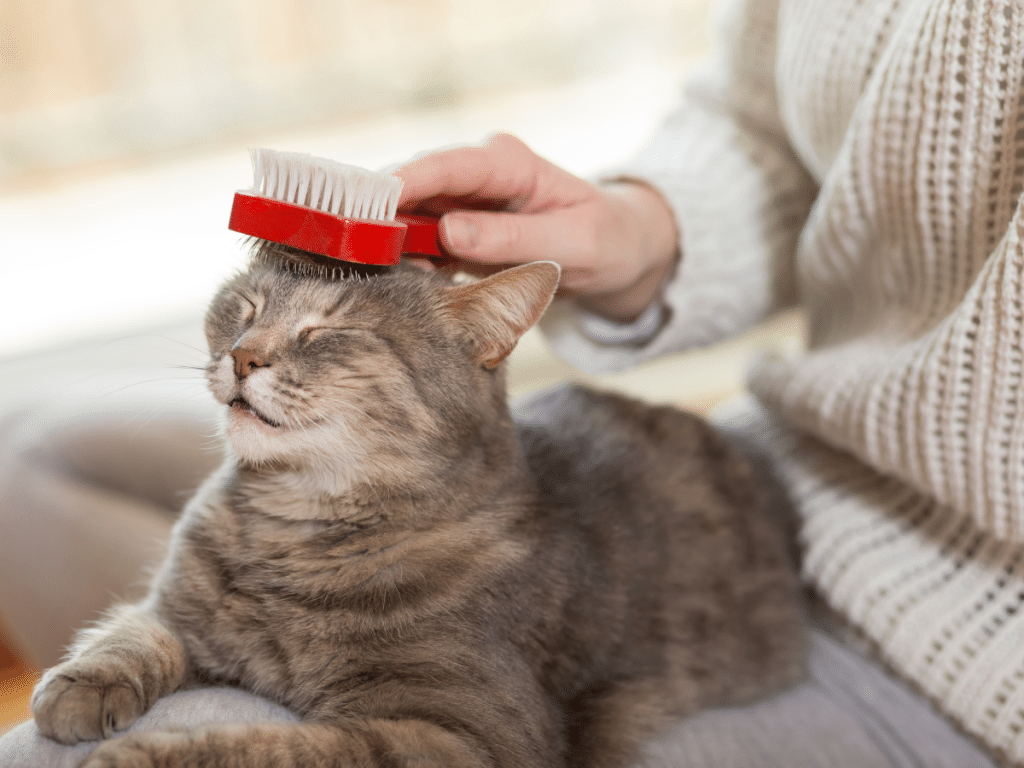
Grooming means bonding for cats. When grooming other cats or their owners, cats consider them part of their family. By grooming your cat you will keep its coat healthy and free of fur mats, and also notice any coat or skin issues in time to be checked by the vet. Such problems can be dry or flaky skin, missing fur, irritated skin, redness on the skin or around the claws.
You can also clean your cat’s ears with a damp cotton ball/ pad and earbuds. You can attend to your cat’s claws and trim them carefully, but remember to NEVER declaw your cat!
10. Bond with your cat

Contrary to many beliefs that cats are loners, they do love attention and like to snuggle on their own terms, so make sure you spend some quality time with your furry friend as often as you get the chance, but make sure you also respect their boundaries and see if they are in the mood for a cuddle.
Cuddling with your cat not only helps you relax and bond with your pet but also has a lot of health benefits. Find out more about the health benefits of owning a cat from our article: Reasons to get a cat
If your cat doesn’t want to be touched its behavior will show you, it can hiss, pull back the ears or the whole body, gently bite you or give you the kicks (repeated kicks with the hind legs) or just leave.
We summarized all the things you should do to make sure your cat’s health it’s at peak condition always:
How to celebrate National Cat Health Month?
- Schedule annual vet appointments
- Vaccinate your cat
- Spay/neuter your cat – if needed
- Get your cat’s teeth cleaned regularly
- Administer monthly preventive treatments against flea, ticks, ear mites, and worms
- Feed your cat good cat food
- Monitor your cat’s litter box habits
- Play with your cat to keep him or her active
- Groom your cat
- Spend quality cuddle time with your cat
We hope you got inspired and now you know how to maintain not only a healthy but also a thriving life for your cat.
Let us know in the comments below what else do you do to keep your cat healthy.






